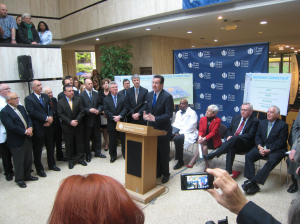
In a minor piece of housekeeping, so to speak, in early June the Connecticut General Assembly posted instructions on how to pick up pink slips for those employed temporarily for the spring legislative session.
If Corporate Connecticut follows through on its threats following a string of new taxes and laws, they won”™t be the only ones.
Backed by an overwhelming and mostly supportive Democrat majority in the Connecticut General Assembly, Gov. Dannel P. Malloy administered the medicine he deemed necessary to get the state back on track to fiscal health.
The question becomes whether in so doing he will have knocked the economy into a catatonic state.
Starting with mostly across-the-board tax hikes and culminating in a bill requiring many businesses to pay employees on days they are out sick, Malloy never shrank from criticism during the session. He appeared before dozens of business groups to make his case and hear their concerns ”“ many of which slashed jobs or pay for their own workers during the panicky months of late 2008 and early 2009 as they attempted to cope with their own balance sheet crises, rather than absorbing additional losses.
As the session neared its scheduled close on June 8, Democrats pushed along bills they say will lead to economic vitality, including legislation to:
- create a new Department of Energy and Environmental Protection coupled with new incentives for energy efficiency;
- free developers of liability for prior pollution of properties they improve, including for substances that leach into nearby parcels owned by others; and
- fund a massive upgrade at the University of Connecticut Health Center with the goal of adding more than 16,000 jobs over multiple decades.
During a press conference in early June, Malloy said Pfizer Inc.”™s recent decision to move hundreds of research jobs from Groton to Massachusetts played a role in his decision to push ahead on the UConn Health Center bill, which is budgeted at $865 million.
“We had a pretty good warning shot across our bow,” Malloy said. “With the exception of stem-cell research ”¦ we have made no similar investment in our public infrastructure. What we”™re doing is supporting a program that in many ways is replicating what private and public universities have done across America. And we”™re doing it not to just protect what we have ”“ and we do have a piece of the bioscience community here in Connecticut ”“ but to substantially expand it.”
Malloy also defended the paid sick leave bill, which has been fought for years by the Connecticut Business & Industry Association and other groups that claim it will put an onerous burden on many companies.
“I think it”™s an important public health initiative,” Malloy said. “Although we”™ll be the first state, there are municipalities that have it in place. In fact we”™ve even looked at and studied the impact in those municipalities and it”™s been relatively positive. So I”™m looking forward to its implementation here in Connecticut.”
Even as Malloy marked those first-term victories, he and his staff had yet to secure final ratification from state employees for cuts to their benefits aimed at saving the state $1 billion annually. Entering June, Malloy still held out the possibility of a doomsday layoff scenario in state government if public employees did not accept cuts in benefits, saying it could stretch far beyond the some 4,700 initially targeted for pink slips last month before Malloy said he had a deal in hand with unions.
“I”™m doing everything in my power not to lay off people,” Malloy said. “I am fully cognizant that I live in a state that has a high unemployment rate and I”™m not looking to add to that unemployment rate, nor am I looking to add to the misery of families that may already have one unemployed spouse.”




















Comments 1